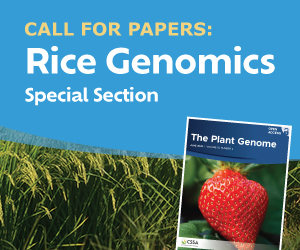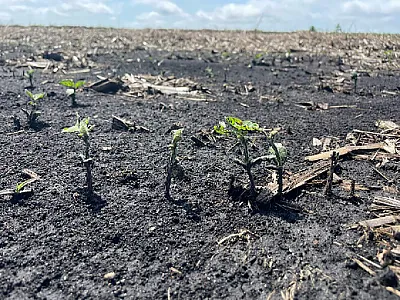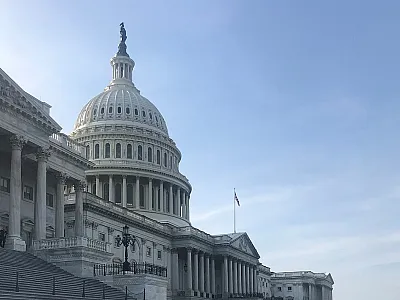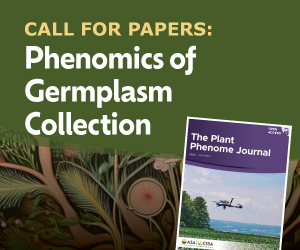Navigating Professional Meetings and Conferences
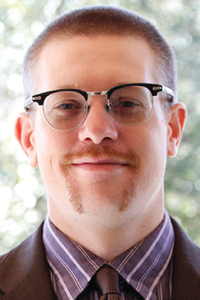
The Societies’ active and productive ASA, CSSA, and SSSA Graduate Student Committee recently hosted a webinar on “Navigating Professional Meetings and Conferences,” to help students decide on and prepare for attending conferences. With our Annual Meeting right around the corner (October 29–November 1), it is likely of topical interest to all members whether it will be their first or 31st meeting.
For inexperienced meeting attendees, welcome—we are very excited to host you! Our community hopes for you learn many new things, meet new colleagues, and have a lot of fun. It is worth planning for the meeting before you go because your time is precious; determining exactly what to get out of attending helps steward your precious time and resources. If you’re asked why you are attending, and you respond, “I don’t know, my adviser is making me go,” that’s a legitimate, but also suspect, answer. Keeping an open mind is important, but you still should have some goals; broadening your awareness is one goal in and of itself. You will meet (many) new people, expand your professional network, and be exposed to new ideas, a new place, and new ways of thinking. We hope it will be a great and memorable experience and the first of many times that you will attend!
It is important to remember that each scientific meeting is unique. Our ASA, CSSA, and SSSA meeting is big…very big! This year, we have more abstracts submitted (3,338) than ever before, and this number is usually highly correlated with the number of attendees, which we expect will top 4,400. The conference is much larger than many others that members might attend with the exception of a few like AGU or ACS. Size plays a big role in the personality of the meeting, just like personalities of large and small universities and companies. Each discipline, society, and meeting has its own culture as well. We have numerous programs to try to help first‐time attendees get acclimated, build networks, and feel part of the group; please look for these and participate in them. No doubt making meaningful connections in a group this large is challenging and stressful, even for extroverts. Introverts may especially need to make sure that they budget in some downtime.
That being said, and I know it might seem contradictory to say, but my advice to you is to plan to participate in as many activities and talks as possible, especially if it pushes you out of your comfort zone. Try not to disappear into your hotel room. A senior colleague once told me that they felt they maximized their professional career at meetings by trying to always be visible and meeting people and not trying to do personal things at the meeting. This is an aspirational goal. Another senior colleague has told me that they always felt their career suffered because they never attended meetings to build a network early on. With support like our caregivers award, we hope to make meeting attendance to build networks more equitable than ever.
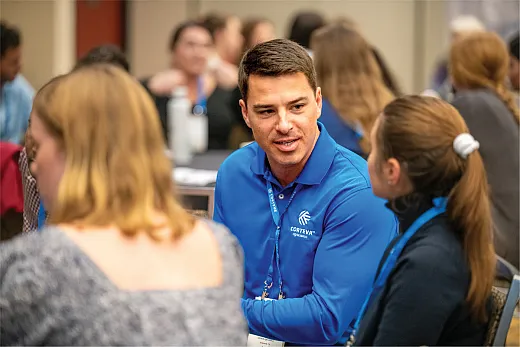
Scheduling and Presenting
In part due to the size and diversity of interests represented at the meeting, you will no doubt at times feel overwhelmed regardless of your plan. It is particularly challenging to find all the talks and poster sessions you would like to attend, let alone attend them. The Societies stopped printing a program in recent years to save trees and because few people were using them and to allow some more flexibility to finalize the program. You can view the program to find talks on the website (acsmeetings.org) and on the SciSoc Mtg app (download it now if you have not already!). I usually start with the “program at a glance” option for my primary divisions (e.g., C‐1 Crop Breeding and Genetics) and begin saving the talks I want to go to on the app. Then I usually search some keywords (e.g., maize, phenomics) to find some talks in other divisions and in our sister Societies (e.g., ASA Biometry and Statistical Computing) as well as talks from colleagues, students, and friends. Next, I look for the big events, the plenary and other major talks that should not be missed, along with special meetings or lunches. Finally, I “browse by day” and fill in holes in my schedule.
We all recognize how frustrating it is when the two talks we most want to participate in are scheduled at the same time and on opposite ends of the conference building! While our staff and leadership try to avoid this, in all, we have planned more than 2,000 talks packed into 400 sessions that are then fit into 60 meeting rooms of varying sizes rooms. It is truly a logistical challenge.
If you are giving a talk, a few helpful rules of thumb are to show up early, stay for the entire session, and whatever you do, do not go over your allotted time (slides should be less than the number of minutes you have to talk, excluding question time). For poster presentations, I can’t give any good advice to avoid the awkwardness of standing by your poster—we have all been there. Make friends with your neighbors, and go out of your way to ask others who are standing awkwardly by their poster about their research. I hope you win the poster competition if you entered! Finally, there are many helpful guides online to both give the best presentations and posters, so make sure you do your research!
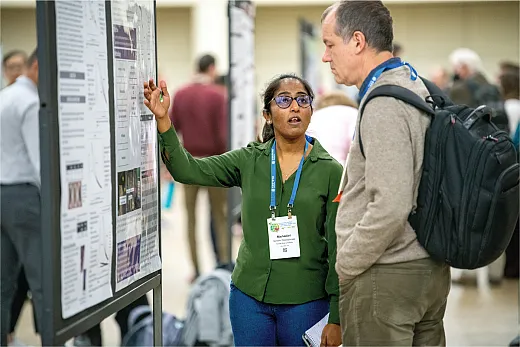
Networking and Mentoring
A major goal of conference attendance should be to expand your professional network. My personal goal is for every meal to try to sit at a table where I know few to no people, especially early career attendees. This has led to great connections over the years, a broader network, and most importantly, broader appreciation of the work our Societies represent. It is again important to recognize that this can be especially tough for introverts. So developing some strategies to maintain your mental health while making the most of your time is worth research, thought, and planning.
A final important piece of advice is to find a colleague, mentor, or group with more experience than you who can help individually guide you to get the most out of the meeting for your interests. If you don’t come to the meeting with someone experienced, look and ask for someone to fill that role. Our community strives to be friendly and welcoming, so I think everyone should be happy to help. You should ask them questions and learn how they personally navigate the meeting and hope they introduce you to their colleagues to further build your networks.
My personal goal is for every meal to try to sit at a table where I know few to no people, especially early career attendees. This has led to great connections over the years, a broader network, and most importantly, broader appreciation of the work our Societies represent.
I am optimistic that this will be our best meeting yet. The state of our disciplines and Societies is strong as is the need for our science. I really hope each of you have a safe, productive, and enjoyable meeting (and win your competitions!). If you have any questions, the staff and your elected leadership are very happy to provide help and input. See you in St. Louis soon!
Text © . The authors. CC BY-NC-ND 4.0. Except where otherwise noted, images are subject to copyright. Any reuse without express permission from the copyright owner is prohibited.




